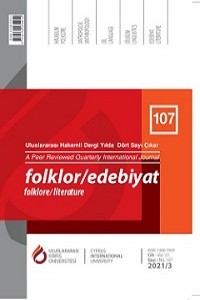Halikarnas Balıkçısı’nda Deniz Motifleri ve Poseidon
Sea Motifs and Poseidon in The Fisherman of Halicarnassus’ Works
Author(s): Tülin ArsevenSubject(s): Novel, Turkish Literature, Theory of Literature
Published by: Uluslararası Kıbrıs Üniversitesi
Keywords: Poseidon; myth; Halicarnassus; novel; story;
Summary/Abstract: Cevat Şakir Kabaağaçlı is one of the important writers of Turkish Literature. In his works, he used the name Halikarnas Balıkçısı (Fisherman of Halicarnassus) as his pseudonym because Bodrum, as its historical name Halicarnassus, was a very important and special place for him. Cevat Şakir mentioned that Bodrum and its beauties in almost all of his works. Cevat Şakir handles Bodrum as well as the Aegean Sea and the Mediterranean Sea and their coasts, natural beauties and people as a whole. This whole also contains these people’s pains, life struggles, fights for bread, beliefs, and narrations. Anatolia together with its sea and land is one huge homeland for him. Cevat Şakir, also one of the leaders of the Blue Nation Movement in our Literature, bases roots of Western Civilization to Anatolia. Kabaağaçlı tries to describe Anatolia and Blue Anatolia with their entire beauties. Meanwhile, his works also include quite a number of mythological elements, narrations, and legends. One of these mythological elements is Poseidon. The main problem of this study is how Poseidon takes place as a mythological character in Cevat Şakir Kabaağaçlı whether it contains differences from its original, or how Poseidon finds his expressions. The Blue Anatolia Movement, pioneered by Cevat Şakir, distinguishes Kabaağaçlı from other authors who include mythological elements in their works. Thus, in this study, document analysis which is one of the quantitative research methods is used, and the relevant resources are scanned within the scope of sea motifs and Poseidon’s myths. In this research, it is tried to determine the effort or way of sea motifs and Poseidon myths to survive from the ancient era to today, and it’s a reflection on Halikarnas Balıkçısı’s work, in other words, to define its traces on modern narrative.
Journal: Folklor/Edebiyat
- Issue Year: 27/2021
- Issue No: 107
- Page Range: 705-720
- Page Count: 16
- Language: Turkish

